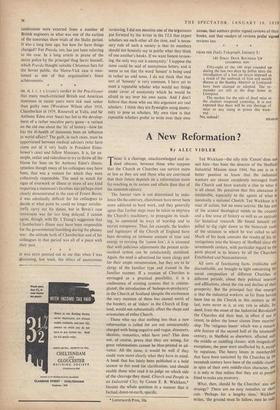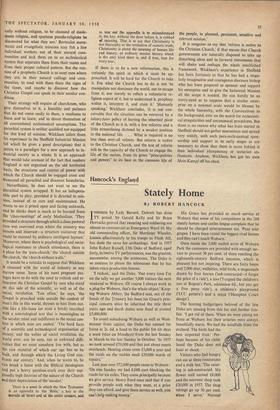A New Reformation?
By ALEC VIDLER THERE is a cleavage, unacknowledged and in- deed obscure, between those who suppose that the Church or Churches can survive more or less as they are and those who are convinced that their future depends on a reformation more far-reaching in its nature and effects than that of the sixteenth century.
The former view is not determined by indo- lence. On the contrary, churchmen have never been more addicted to hard work, and they generally agree that further steps must be taken to improve the Church's machinery, to propagate its teach- ing, to commend its ways of worship and to recruit manpower. Thus, for example, the leaders and legislators of the Church of England have been devoting an immense amount of time and energy to revising the `canon law'; it is assumed that with judicious adjustments the present eccle- siastical system can be satisfactorily stabilised. Again, the need is advertised for more clergy and for their ample remuneration, but they are to be clergy of the familiar type and trained in the familiar manner. If a reunion of Churches is envisaged as a practical possibility, it is a coalescence of existing systems that is contem- plated; the introduction of 'bishops-in-presbytery' in the Church of Scotland (despite the excitement the very mention of them has caused north of the border), or of 'elders' in the Church of Eng- land, would not substantially affect the shape and orientation of either Church.
Those who say that nothing less than a new reformation is 'called for are not unreasonably charged with being negative and vague, dreamers, idealists, romantics, what have you? This does not, of course, prove that they are wrong, for great reformations cannot be blue-printed in ad- vance. All the same, it would be well if they could state more clearly what they have in mind. A book that has lately been published is a bold answer to this need for clarification, and should enable those who read it to judge on which side of the cleavage they stand. Church and People in an Industrial City, by Canon E. R. Wickham,* focuses the whole question in a manner that is factual, down-to-earth, specific.
* Lutterworth Press, 30s. Ted Wickham—the silly title 'Canon' does not suit him—has been the director of the Sheffield Industrial Mission since 1944. No one is in a better position to know that the industrial workers are almost completely estranged from the Church and have scarcely a clue to what it is all about. He perceives that this alienation is intolerable, especially to the agents of what iS nominally a national Church. Ted Wickham is man of action, but no mere activist. He has one of the acutest theological minds in the countrY and a fine sense of history as well as an aptitude for historical research. He found himself im pelted to dig right down to the historical roots of the situation in which he was called to act Much of his book contains the results of his in vestigations into the history of Sheffield since the seventeenth century, with particular regard to the parts played in its history by all the Churches Established and Nonconformist. - All sorts of fascinating facts, creditable and discreditable, are brought to light concerning the social composition of different Churches at different periods, about their political interests and affiliations, about the rise and decline of their prosperity. But the principal fact that emerge is that the industrial workers, so far from having been lost to the Church in this century or the last, were never in it, at any rate as adults. In deed, from the onset of the Industrial Revolution the Churches did their best, in effect if not io intent, to debar the lower classes from member ship. The 'religious boom' which was a remark able feature of the second half of the nineteent! century, in Sheffield as elsewhere, affected 0n13 the middle or middling classes; with insignificant exceptions, the poor were unaffected by it, excal by repulsion. The heavy losses in membershif that have been sustained by the Churches in 014 twentieth century have been of the middle classes in spite of their own middle-class character, araJ it. is only in that milieu that they are at present fitted to make any recovery.
What, then, should be the Churches' aim an strategy? There are no easy remedies or shorl cuts. 'Perhaps for a lengthy time,' Wickhan' writes, 'the ground must lie fallow, men be radi' cally without religion, to be cleansed of inade- quate religion, and spurious pseudo-religions be discovered for what they are.' Revivalist move- ments and evangelistic missions may fish a few individual workers out of their natural corn- munities and tack them on to an ecclesiastical System that separates them from their mates and from their proper cultural pattern. But the mis- sion of a prophetic Church is to meet men where they are, in their natural callings and com- munities, to read with them there the signs of the times, and maybe to discover how the Christian Gospel can speak to their secular con- dition.
Their strategy will require of churchmen, Who give themselves to it, a humility and patience that do not come easily to them, a readiness to listen and to learn, and to divest themselves of all conventional ecclesiastical assumptions. The Parochial system is neither qualified nor equipped for this kind of mission. Wickham infers from his experience in the Sheffield Industrial Mission (of which he gives a good description) that it Points to a paradigm for a new approach to in- dustrial society as a whole. It is an approach that would take account of the fact that modern England is not organised on the old territorial basis; the structures and centres of power with Which the Church should be engaged cross and transcend all parochial and diocesan boundaries.
Nevertheless, he does not want to see the Parochial system scrapped. It has an indispens- able part to play, provided it is directed to mis- sion, instead of to care and maintenance. He Wants to see it prised open and facing outwards, and he thinks there is much to be learned from the 'class-meetings' of early Methodism, 'They Provided a structure through which a close pastoral care was exercised even where the ministry was remote and itinerant—a structure moreover that could be manned by ordinary intelligent laymen.' 'Moreover, where there is psychological and socio- logical resistance to church attendance, there is a place for the 'para-church,' the 'church outside the church,' the 'church without walls.'
It would be a mistake to suppose thai Wickham is obsessed with the world of industry in any narrow sense. Some of his most pregnant pas- sages have to do with the need to rethink and re- interpret the Christian Gospel by men who stand on this side of the scientific, as well as of the social, revolution. 'Too often,' he says, 'the Gospel is preached wide outside the context of Man's life in this world, thrown to him from out- side like a life-buoy (or even a brick) inscribed With a soteriological text that is meaningless to the secular mind and indifferent to the social con- text in which men are rooted.' The hard facts I a scientific and technological organisation of society, and the welter of social revolution the World over, can be seen, not as awkward diffi- culties that we must somehow live with, but as the raw material of which our age has to be built, and through which the Living God con- fronts our century.' And, when he wants to, he can break a lance with the Biblical theologians and put a heavy question-mark over their sup- Posedly high doctrine of the nature of the Church and their depreciation of the 'secular.'
There is a sense in which the New Testament is an appendix to the 'Bible,' a key to the travails of Israel and of the entire cosmos, and
to tear out the appendix is to misunderstand it; the key, without the door before it, is robbed of meaning. That is to say that Christianity is not theosophy or the revelation of esoteric truth; Christianity is about the meaning of human life and history, of ordinary secular history which is the only kind there is, and if true, true for every mar..
If there is to be a new reformation, this is certainly the spirit in which it must be ap- proached. It will be hard for the Church to take it. For what the Church has to do is not `to manipulate nor dominate the world, nor to escape from it, nor merely to reflect a voluntarist re- ligious aspect of it, but to understand it, prophesy within it, interpret it, and stain it.' `Humanly speaking,' Wickham concludes, 'it is not con- ceivable that the situation can be retrieved by a laissez-faire policy of leaving the inherited plant of the Church as it is, with a few reforms and a little streamlining dictated by a weaker position in the national life. . . . What is required is no less than over-all reform. But reform is native to the Christian Church, and the test of reform will be the capacity of the Church to engage the life of the nation, from its great "principalities and powers" to its base in the common life of the people, in planned, persistent, sensitive and relevant mission.'
It is sanguine to say that 'reform is native to the Christian Church,' if that means that Church governments are naturally, disposed to take up disturbing ideas and to forward movements that will shake and reshape the whole established framework. Wickham's experience in Sheffield has been fortunate in that he has had a singu- larly imaginative and courageous diocesan bishop who has been prepared to sponsor and support his enterprise and to give the Industrial Mission all the scope it needed. He can hardly be so starry-eyed as to suppose that a similar enter- prise on a national scale would be blessed by the whole hierarchy, with the Convocations in the background, ever on the watch for ecclesiasti- cal irregularities and uncanonical procedures. But there is no reason why what has been started in Sheffield should not gather momentum and spread very widely, with such para-ecclesiastical spon- sorship and support in its early stages as are necessary to show that there is more behind it than individual idiosyncrasy or sectarian en- thusiasm. Anyhow, Wickham has got his own Mein Kampf off his chest.



































 Previous page
Previous page